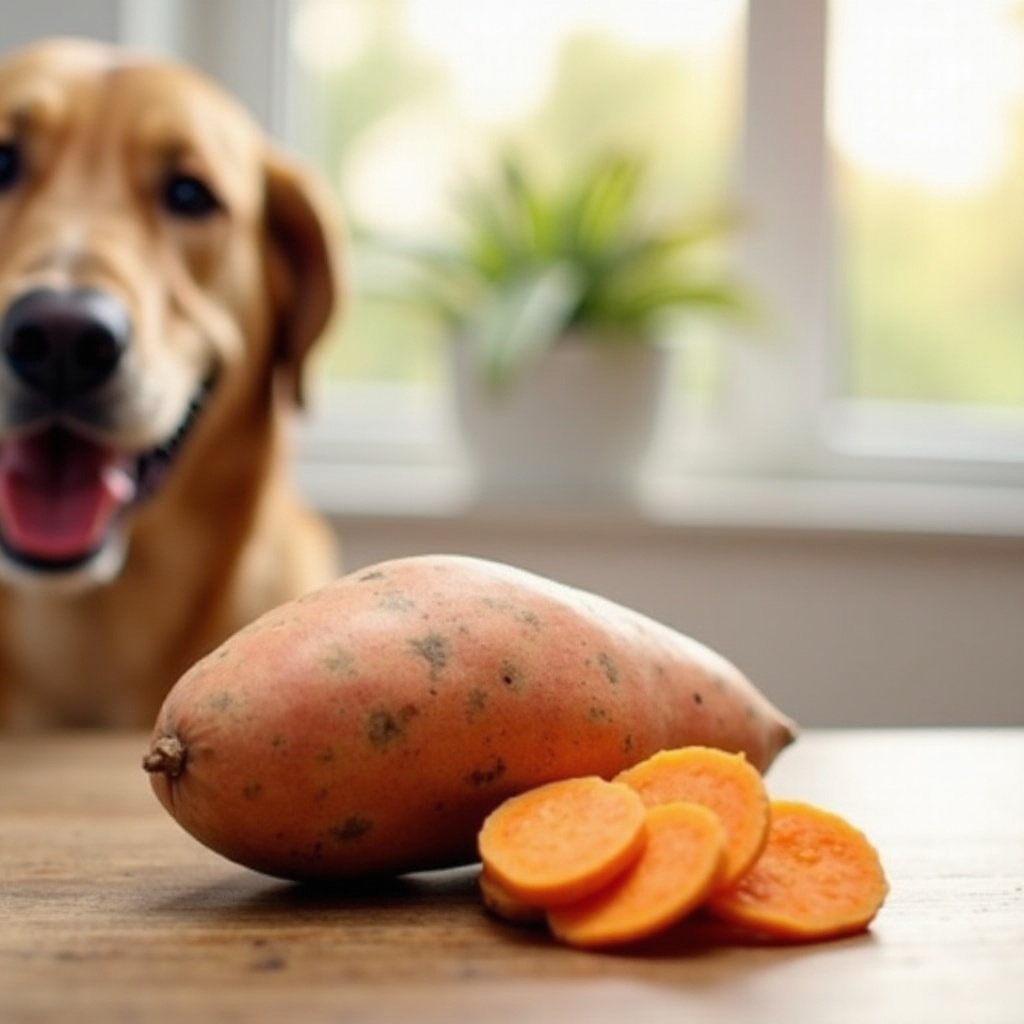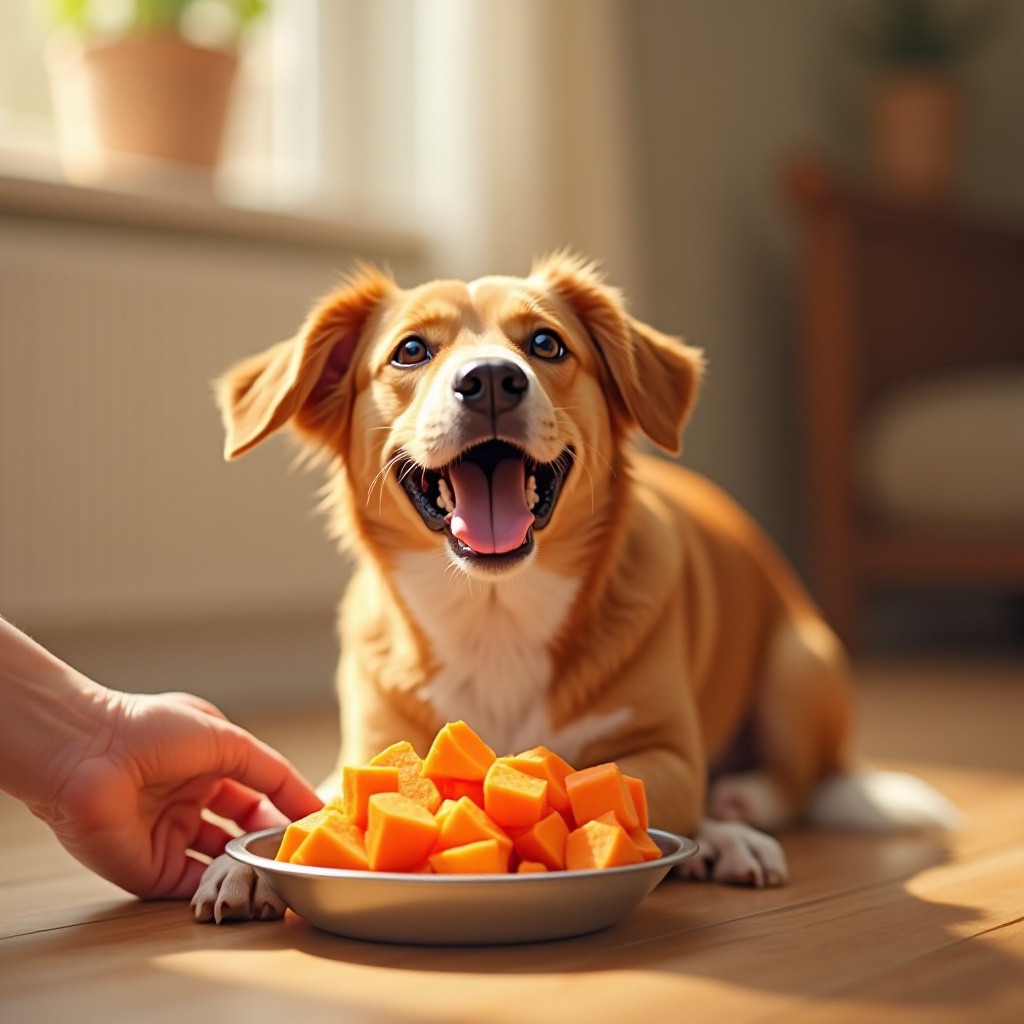Introduction
Dealing with a dog suffering from diarrhea can be distressing for any pet owner. One natural remedy that has been growing in popularity is the use of sweet potatoes. Known for their mild flavor and numerous health benefits, sweet potatoes can be a soothing and nutritious addition to your dog’s diet, especially when they are experiencing digestive issues.

Why Sweet Potatoes Are Beneficial for Dogs
Sweet potatoes are packed with nutrition, making them an excellent treat for dogs. These root vegetables are rich in dietary fiber, which aids in feeding the good bacteria in a dog’s gut, promoting healthier digestion. They also contain vitamins like A, B6, and C, which support your dog’s overall health by boosting their immune system and promoting good vision and skin health.
Additionally, sweet potatoes are high in beta-carotene, a powerful antioxidant that helps to prevent chronic diseases by neutralizing free radicals. The low-fat content of sweet potatoes also makes them a great choice for dogs who need to maintain a healthy weight.

Understanding Diarrhea in Dogs
Diarrhea is a common issue in dogs and can be caused by various factors. Understanding the root causes and recognizing the symptoms early can help ensure your pet gets the care they need quickly.
Common Causes of Diarrhea
Several factors can lead to diarrhea in dogs, including sudden dietary changes, food intolerances, and infections. Parasites such as worms can also cause digestive disturbances. In some cases, diarrhea may signal an underlying health condition that requires veterinary attention.
Symptoms to Look Out For
Besides frequent, watery stools, symptoms of diarrhea in dogs can include lethargy, a noticeable decrease in appetite, and general discomfort. Pay attention to any signs of dehydration, such as a dry nose or gums, as diarrhea can lead to significant fluid loss.
How Sweet Potatoes Help with Diarrhea
Incorporating sweet potatoes into your dog’s diet can have a calming effect on their digestive system. Here’s how these vegetables work their magic.
Digestive Benefits of Fiber
One of the key components of sweet potatoes is dietary fiber, which adds bulk to the stool and helps to regulate bowel movements. By absorbing water in the intestines, fiber reduces fluidity and helps solidify the stool, making it easier for your dog to pass.
Other Essential Nutrients
Beyond fiber, sweet potatoes offer other essential nutrients that support gut health. They contain manganese, an essential mineral for metabolism, and potassium, which aids in muscle function and fluid balance. These nutrients work together to ensure your dog’s digestive system operates smoothly.
Homemade Sweet Potato Treat Recipes for Dogs
Making your own sweet potato treats at home ensures you’re providing healthy, unprocessed food for your dog. Here are a few simple recipes to get you started.
Simple Baked Sweet Potato Chips
- Preheat your oven to 250°F (120°C).
- Slice a sweet potato into 1/8-inch thick rounds.
- Arrange slices on a baking sheet lined with parchment paper.
- Bake for 3 hours, flipping halfway through, until crispy.
- Allow to cool, then serve in moderation.
Sweet Potato and Chicken Jerky
- Preheat your oven to 200°F (90°C).
- Cut a sweet potato into thin strips.
- Slice chicken breast into similar-sized strips.
- Lay sweet potato and chicken strips on a baking sheet.
- Bake for 4-5 hours until dehydrated.
- Let cool completely before serving.
Sweet Potato and Coconut Oil Biscuits
- Preheat your oven to 350°F (175°C).
- Mix 1 cup of mashed sweet potato, 1 cup of whole wheat flour, and 2 tablespoons of coconut oil.
- Roll dough out and cut using cookie cutters.
- Place on a baking sheet lined with parchment paper.
- Bake for 25-30 minutes until golden brown.
- Cool before giving to your dog.
Feeding Guidelines and Safety Tips
While sweet potatoes are beneficial, moderation is key. Introduce them gradually to observe how your dog reacts. For small dogs, one to two teaspoons of cooked sweet potato per day is adequate, while larger dogs can have up to half a cup. Always ensure the sweet potatoes are cooked thoroughly and served plain, without any added seasonings or sugars.
It’s crucial to monitor your dog for any adverse reactions. Some dogs may experience gas or soft stools if they consume too much fiber too quickly. If symptoms persist, consult your veterinarian promptly.

Conclusion
Sweet potatoes can be a valuable addition to your dog’s diet, especially when they’re dealing with diarrhea. The high fiber content and rich nutritional profile help support digestive health and overall well-being. By incorporating these healthy treats into their diet, you can help soothe your dog’s digestive system naturally.
Frequently Asked Questions
Can I give my dog sweet potatoes every day?
Yes, but in moderation. Ensure you’re not overfeeding to avoid digestive issues and consult with your vet for personalized advice.
How long does it take for sweet potatoes to help with diarrhea?
Improvement can be noticed within a day or two if the sweet potatoes are helping. If no improvement is seen, consult your vet.
Are there any side effects of feeding sweet potatoes to dogs?
Potential side effects include gas or soft stools if too much is given. Always introduce new foods gradually and monitor your dog’s response.
